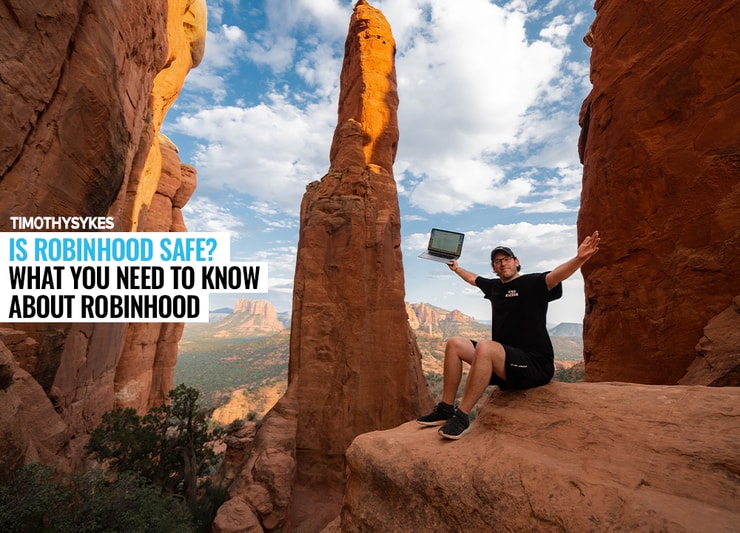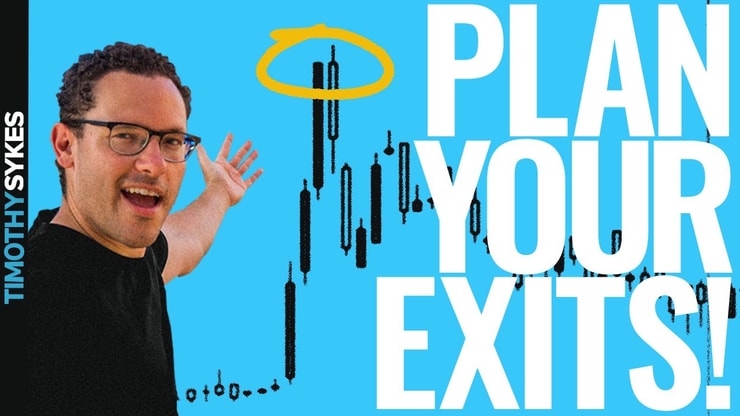Is Robinhood Safe: Key Takeaways:
- Why I won’t use Robinhood to trade penny stocks…
- Will Robinhood list Shiba Inu? Here’s what I think…
- What you need to know about the recent Robinhood data breach…
You probably got here because you searched “is trading on Robinhood safe?” or “will Robinhood list Shiba Inu?” If you follow me on Profit.ly, you already know what I think…
But I’m glad you’re here. Trading is a battlefield, and there are rules key to survival.
So I get angry when an online brokerage app like Robinhood markets itself as a ticket to financial freedom. I’ve seen their commercials where they’ve marketed the promise of ‘getting rich quick,’ appealing to the worst instincts in a trader.
Consider this article a warning. There are ways to win at trading. And there are 10 times as many ways to lose…
Table of Contents
- 1 What Is Robinhood?
- 2 History of Robinhood
- 3 Understanding How Robinhood Works
- 4 List of Features
- 5 Crypto and Shiba Inu on Robinhood
- 6 Robinhood Gold
- 7 What’s the Difference Between Robinhood and Other Trading Platforms?
- 8 Is Robinhood Safe?
- 9 What Are the Risks of Trading on Robinhood?
- 10 Free Stocks on Robinhood: What’s the Catch?
- 11 How Does Robinhood Make Money?
- 12 Should You Use Robinhood to Trade?
- 13 Most Frequently Asked Questions (After the “Is Robinhood Safe” One)
- 14 Is Robinhood Good for Beginners?
- 15 What’s the Catch With Robinhood?
- 16 Does Robinhood Take Your Money?
- 17 Is Robinhood Safe to Link to a Bank Account?
- 18 How Do I Get My Money Out of Robinhood?
- 19 Is Robinhood Illegal?
- 20 Conclusion: Is Robinhood Safe?
What Is Robinhood?

2025 Millionaire Media, LLCRobinhood is an online-only brokerage. Its claim to fame is commission-free trading. And of course, those ads that imply that money will gush out of the app.
It launched in 2014 with a waitlist of 500,000. Now it has more monthly trades than E-Trade and Charles Schwab combined.
Add to that 24/7 crypto trading and Robinhood’s positioned to make trading accessible to more people. An egalitarian assault on Wall Street.
My followers know how I feel about assaults on Wall Street. I like them and base a lot of my teaching career on them.
But … I want to teach newbies how to think for themselves in the market, not see them lose money.
To me, it seems like Robinhood is a massive funnel for pulling new traders into the market. It gives them a sleek interface and default access to margin accounts. But from what I’ve heard, it doesn’t provide the best executions or customer service.
And the recent Robinhood data breach implies they’re not careful with customers’ info. More on that later…
In my opinion, it’s a recipe for inexperienced traders to blow up their accounts.
History of Robinhood

2025 Millionaire Media, LLCIn 2013 two college buddies, Vladimir Tenev and Baiju Bhatt, decided to create a brokerage.
After designing trading software for a few New York hedge funds, they made some observations…
- Most brokerages had minimum account set-up fees.
- They also charged upward of $10 per trade — while they were charged tiny amounts.
These guys figured they could change the model and make trading more accessible.
According to their mission statement, they wanted to “provide everyone with access to the financial markets, not just the wealthy.”
And in 2014, Robinhood officially launched to great hype.
It gained a reputation as a ‘millennial’ platform — with good reason. In 2015, nearly 80% of its customers had an average age of 26. And Robinhood’s had an impact on traders of all ages and experience levels.
In October of 2019, a wave of brokerages — including E-Trade and Charles Schwab — went commission-free. Robinhood’s largely viewed as the catalyst for that change.
Here are some key stats from Robinhood’s history that show its growth:
- 2017: Robinhood’s valued at $1.3 billion and reported to have 200,000 daily active users.
- 2018: Robinhood’s valued at $5.6 billion with reportedly 664,775 daily active users.
- 2020: Robinhood’s valued at $8.3 billion. By the summer of 2020, Robinhood reportedly had 13 million total users. Three million of those accounts were added in the first quarter of 2020 alone. (See all these stats here.)
- 2021: Robinhood stock went public on July 29 through an IPO.
- Currently, Robinhood stock is trading around $30.50. Giving the company a market cap of roughly $25 billion.
Some retail traders lost faith in Robinhood after being locked out of trading meme stocks in early 2021. But there’s an army waiting for Robinhood to list Shiba Inu. More on that later.
Understanding How Robinhood Works
At its core, Robinhood is a trading app and website. You can buy and sell stocks on Robinhood. Unless you’re talking about the OTC stocks that I love — those penny stock markets are off limits.
They added crypto some time ago. But like OTCs, some crypto coins like Shiba Inu aren’t available on Robinhood. Yet.
To all those using #Robinhood and #webull missing out on the absolutely amazing runups on $ALYI $AABB $BBRW $BRTXQ $IGEN $AXXA $SITS $ZICX $WKSP wake the hell up & realize you're missing out on the plays that can truly grow your account EXPONENTIALLY! Read https://t.co/Ens8xBEzdW
— Timothy Sykes (@timothysykes) August 31, 2020
It’s one of many trading apps — read my Robinhood app review here. But I prefer to do my trading from a more powerful platform.
My go-to is StocksToTrade. It features awesome charting capabilities and a highly customizable stock screener. And it directly links to news on stocks and social media buzz.
I used to have 20 different browser windows open to do all the work I could on StockToTrade.
Robinhood can’t do any of this. No, StocksToTrade isn’t free … but you can try it for 14 days for just $7. I think you’ll see that’s money well spent.
List of Features

2025 Millionaire Media, LLCWhen Robinhood started, it was primarily a platform for trading stocks and funds. They’ve expanded over the years. Here’s a current list of features for Robinhood…
Stocks and Funds
Commission-free trading for stocks and funds was the original Robinhood product. It remains one of its primary offerings.
In 2016, it introduced instant deposits. Customers can use up to $1,000 right the deposit versus waiting a few days for the ACH transfer to process.
Robinhood customers can also buy fractional shares and opt into automatic dividend reinvestment.
Options Trading
In 2017, Robinhood began offering zero-commission options trading. Currently, traders go through a process before they ‘unlock’ portions of the options trading platform.
I’d say that’s a good thing, but the reason they put those locks in effect is troubling. In 2020, a young trader committed suicide. He left a note about his $730,000 in losses trading options on Robinhood.
Adding to the senselessness of the tragedy, it later turned out he hadn’t taken the massive loss he thought.
I’m not an options trader. But I can say with certainty that it’s well worth pursuing an education in any type of trading before you start.
More Breaking News
- Novo Nordisk’s Stock Surge: Analyzing the Phenomenon
- The Trade Desk: Unleashing New Potential?
- Centrus Energy Corp.: Opportunity or Overheating?
Banking
In 2018, Robinhood announced it would offer checking/savings accounts and debit cards.
Initially, it claimed the accounts would have a 3% annual interest rate — significantly higher than most other banks. They also said the Securities Investor Protection Corporation (SIPC) would insure accounts.
Apparently, the SIPC hadn’t gotten the memo — the backlash was rapid.
It was quickly rebranded “Cash Management,” which debuted in 2019. Customers can use it for basic banking. There’s a debit card too.
Crypto and Shiba Inu on Robinhood

2025 Millionaire Media, LLCIn early 2018, Robinhood began a waitlist for commission-free cryptocurrency trading. By the end of the first day, the waitlist had over a million people on it.
Robinhood Crypto debuted the same year, allowing customers to trade cryptos 24/7. But since it requires a different account, margin trading isn’t permitted.
Robinhood reported 60% of its funded accounts traded crypto in Q2 2021. And crypto transaction revenue was $233 million.
But degenerates don’t care about revenues. Crypto traders just want to know, “Is Robinhood listing Shiba Inu?” The meme token soared roughly 82,000,000% in 2021. Crazy for a coin that started as a joke.
Many crypto traders think if Robinhood lists Shiba Inu, it will send the coin even higher. After all, the coin spiked in September when it listed on Coinbase. And a petition on Change.org requesting Robinhood list Shiba Inu has over 530,000 signatures as of this writing.
There’s definitely demand for crypto trading on Robinhood. So when will Robinhood list Shiba Inu?
I don’t know and I don’t care. I don’t trade sketchy cryptos. To me, it’s just one more way for degenerates to gamble 24/7 from their phones. I’ll stick to the penny stocks I know and love.
Robinhood Gold
In 2016, Robinhood debuted its premium product, Robinhood Gold. For an added fee, subscribers get perks like bigger instant deposits, Level 2 market data, Morningstar research, and access to investing on margin.
What’s the Difference Between Robinhood and Other Trading Platforms?

2025 Millionaire Media, LLCIf you asked this five years ago, when Robinhood debuted, it would have been easy to answer. Back then, they were the first broker to offer free commissions.
The trade-off was its less than ‘Best Executions.’ FINRA even assessed a $1.25 million penalty in 2019 for these ‘Best Execution’ violations.
2019 was also the year that many major brokerages went to a no-commission model. I’m not a fan. Inexperienced traders shouldn’t trade so much that they can’t afford commissions. And these days, commission-free doesn’t even make Robinhood special.
Is Robinhood Safe?
Here’s what I can say…
Robinhood is insured like any other broker. It has the standard $500,000 SIPC protection per account, so you’d be covered if it ever implodes. This doesn’t cover money in its high-interest checking or savings accounts.
And they pay for that protection with the standard fees on sell orders.
Is Robinhood safe to link your bank account to? Seems so.
Is Robinhood safe to give your social security number to? Also seems so.
Will you like what you find if you search “is Robinhood safe” on Reddit? Probably not.
And the recently reported Robinhood data breach makes me even more skeptical…
On November 3, 2021, the company announced a security breach that resulted in hackers obtaining five million users’ email addresses. The company said, “we believe that no Social Security numbers, bank account numbers, or debit card numbers were exposed.” That’s a minor comfort.
What Are the Risks of Trading on Robinhood?
When you ask “is Robinhood safe,” you want to know how it will affect you personally.
Here’s how I think Robinhood’s quirks will affect YOU.
Say you’ve found a stock with some potential. Maybe it’s spiking on news … or riding high on a first green day…
Maybe you held it too long and need to get out NOW.
Successful trading depends on your ability to react. You need to be able to cut losses quickly and take gains before it’s too late.
Either way, a less than ‘best’ execution can absolutely kill you.
And if your broker is unavailable when you need to make a trade? Then you’re just like all the other unlucky traders who report getting burned.
Robinhood issues a statement as to why it's crashing, basically saying they suck and admit it for once
— Timothy Sykes (@timothysykes) March 2, 2020
Free Stocks on Robinhood: What’s the Catch?
What’s with Robinhood’s free stock promotion? Don’t get too excited. 98% of the free stocks given out have a value of between $2.50 and $10.
Here’s what other brokers offer … Merrill Lynch offers a cash reward of up to $1,000 on a new account. The catch is that you have to invest $200,000 to qualify.
TradeStation has a $5,000 promo. That won’t be much compared with the $5 million you’ll need to give them.
So Robinhood’s free stock offer starts to look better by comparison. And there’s always the chance you’ll win the lottery with your 1% chance of getting a stock valued between $50 and $200.
How Does Robinhood Make Money?

2025 Millionaire Media, LLCIt all comes back to the routing.
When Robinhood settled for $1.25 million with FINRA, it didn’t have to admit or deny any wrongdoing. The penalty was for failing to ensure its customers got the best prices on their orders.
Why would a brokerage not want to deny that?
One of the ongoing SEC investigations is into a related practice. The company allegedly sells its client order flow to high-frequency trading firms. It kept this income stream off its website until 2018.
If you’ve read Michael Lewis’s 2014 bestseller “Flash Boys,” you’ll know that this practice is kinda suspect. Even so, most online brokers in the no-commission age do this. At least they disclose it.
Another thing surfaced in the SEC complaint. Robinhood allegedly charges market makers a variable percentage on each trade. This is instead of a fixed rate. Critics say Robinhood traders suffer because of this too.
(As an Amazon Associate, we earn from qualifying purchases.)
Should You Use Robinhood to Trade?
Ultimately, that decision is yours to make. I personally don’t like Robinhood. To me, it fails to meet my minimum criteria.
It blows my mind people still aren't using @StocksToTrade or brokers listed at https://t.co/Ens8xBmXPm and missing fucken gimmies like $KBEVF $SHMP $MTP or $PURA due to not seeing Level 2 or not being able to trade them at shitty Robinhood…be better prepared, stop wasting $!
— Timothy Sykes (@timothysykes) February 28, 2019
There are a lot of online brokers. The trick is finding the right one for you.
I use E-Trade and Interactive Brokers. I like a lot of things about them and dislike some things about them too. But they have one thing in common that I need in a broker: size.
They’re both huge companies. I feel like my money is safer with them. They have shares to borrow, and they execute trades pretty quickly.
Find what works for you
Most Frequently Asked Questions (After the “Is Robinhood Safe” One)
In my opinion, Robinhood is safe if you’re ticking off regulatory boxes like insurance, BUT…
Is Robinhood Good for Beginners?
No. Not in my opinion.
What’s the Catch With Robinhood?
The catch is that they’re known for less than ‘Best Executions’ and service disruptions.
Does Robinhood Take Your Money?
Robinhood will take your money, just like any broker. Your job as a trader is to prepare. So it’s crucial to research everything from which broker you use to your trading platform to your strategy. Never underestimate the power of investing in a good trading education.
Is Robinhood Safe to Link to a Bank Account?
Robinhood won’t withdraw money without your OK.
How Do I Get My Money Out of Robinhood?
Wait until any deposits and trades settle first. Then you can withdraw from your ‘Withdrawable Cash’ account.
Is Robinhood Illegal?
No, this broker is not illegal. In the end, it’s no one’s fault but your own if you lose money on a trade. This is why I always tell you to study and do your research.
Conclusion: Is Robinhood Safe?

2025 Millionaire Media, LLCLet’s put Robinhood aside. Sure, we can find reports of them screwing up executions and occasionally putting trades on ice. Others have reported bad customer service…
It may also be difficult if not impossible to trade OTC markets on their platform. And if you want to trade Shiba on Robinhood, you’re out of luck there too. For now.
But bottom line, your trades are ultimately on you.
They’re a product of your work and studying. There are a lot of resources to help you…
My free penny stock guide is a good place for newbies to start.
If you want to get up to speed fast, try my 30-Day Bootcamp.
And if you’re ready to make a real commitment to your trading, apply for my Trading Challenge.
I don’t accept everyone in my Challenge. My students commit to their goals. They work hard to get better every day.
The best among them make more money than I ever have. It’s awesome!
I love seeing people start with nothing but a small account and dedication and end up self-sufficient traders. If that’s your goal, apply for my Trading Challenge today!
What do you think about Robinhood? I want to hear it all. Let me know in the comments!




Leave a reply